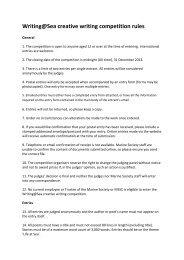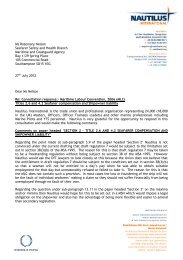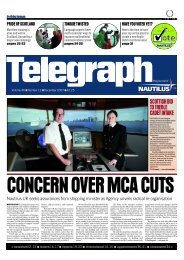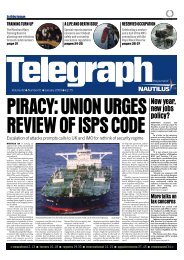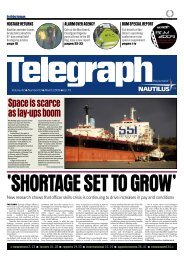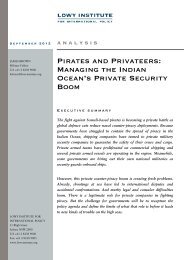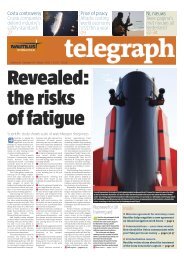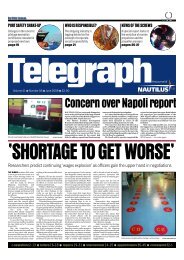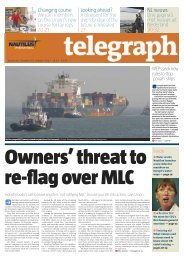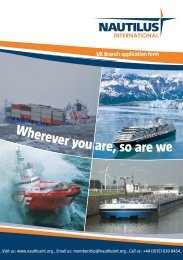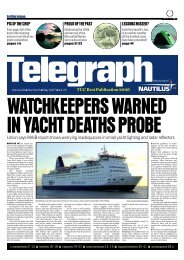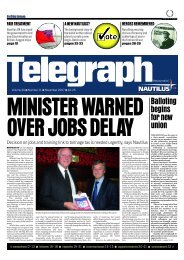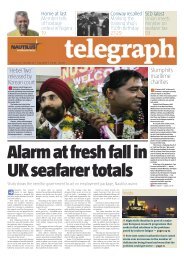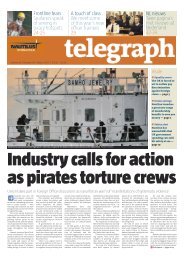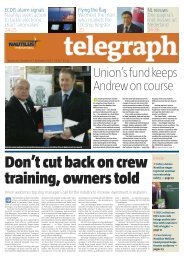NAUTILUS P01 OCTOBER 2010.qxd - Nautilus International
NAUTILUS P01 OCTOBER 2010.qxd - Nautilus International
NAUTILUS P01 OCTOBER 2010.qxd - Nautilus International
Create successful ePaper yourself
Turn your PDF publications into a flip-book with our unique Google optimized e-Paper software.
28 | telegraph | nautilusint.org | October 2010<br />
SEAFARER WELFARE<br />
29 years of vessel visits<br />
Ship visitor Buddy Hincke has clocked up almost three<br />
decades of work for seafarers in the US port of Coos Bay.<br />
But as he now approaches his 83rd birthday, he says<br />
his legs are getting tired, and he will start his second<br />
retirement next year. Here, he looks back on an eventful life<br />
closely intertwined with the sea…<br />
MN rating<br />
wanting to<br />
move ahead<br />
Collect up to £15,500<br />
to help your studies<br />
Are you a Merchant Navy rating<br />
considering career progression<br />
The JW Slater Fund,<br />
administered by <strong>Nautilus</strong><br />
<strong>International</strong>, offers awards of<br />
up to £15,500 to help ratings<br />
study for a first certificate of<br />
competency.<br />
And there is a discretionary<br />
bonus of £1,000 on obtaining<br />
an approved OOW Certificate.<br />
More than 1,100 Slater Fund<br />
awards have been made by the<br />
Union since the scheme was<br />
launched in 1997.<br />
Named in honour of former<br />
MNAOA general secretary<br />
John Slater, the awards are<br />
made to selected UK-resident<br />
ratings aged 20 or over.<br />
The money can be used<br />
towards the costs of any<br />
necessary full- or part-time<br />
education, and to provide some<br />
financial support during college<br />
phases for those off pay.<br />
<strong>Nautilus</strong> <strong>International</strong><br />
is now inviting applications<br />
for the 2010 awards. If you<br />
want to make the next move,<br />
don’t leave things to chance —<br />
fill in the form on the right,<br />
or apply via<br />
www.nautilusint.org<br />
The Marine Society provides<br />
education and careers<br />
advice for applicants.<br />
Scenes from a fascinating<br />
ng<br />
life: Buddy Hincke with<br />
seafarers onboard ship and<br />
in his home; in the forces<br />
(including a meeting with<br />
Bob Hope); and with his<br />
collection of international<br />
bank notes, above<br />
COMPLETE THIS FORM<br />
AND SEND IT TO:<br />
The Marine Society<br />
202 Lambeth Road<br />
London SE1 7JW.<br />
I am over 20 years of age<br />
and a rating normally resident<br />
in the United Kingdom.<br />
Please send me details of the<br />
John Slater Award.<br />
Name: _______________________________________<br />
__________________________________________________<br />
Address: ____________________________________<br />
__________________________________________________<br />
__________________________________________________<br />
__________________________________________________<br />
Email: ________________________________________<br />
__________________________________________________<br />
Details are also available online<br />
at: www.nautilusint.org<br />
or email your name, address<br />
and request for Slater Fund<br />
details to: careers@ms-sc.org<br />
500<br />
F<br />
During the last year of<br />
WWII I sailed as a messman<br />
on troop transports<br />
in the Atlantic: the USAT George<br />
Washington and the USAT Laconia<br />
Victory. We always travelled in<br />
convoys of 80 to 150 ships.<br />
On both of these ships we carried<br />
fresh soldiers and German<br />
prisoners back to Europe, landing<br />
at Le Havre and Antwerp. On the<br />
return trips to the USA we brought<br />
back soldiers who had enough<br />
points to return to the States, as<br />
well as the wounded.<br />
When the war ended with<br />
Germany, I went to San Francisco<br />
and sailed throughout the Pacific<br />
until the war ended with Japan.<br />
I was sailing on a Standard Oil<br />
tanker and we sailed alone. This<br />
was a strange feeling for me after<br />
sailing in convoys.<br />
In later years I was a telegraph<br />
operator for several railroads, and<br />
served in the US Air Force for five<br />
years as a radio operator. I spent<br />
three years in the Japanese occupation<br />
and was also in the beginning<br />
of the Korean War, working<br />
our way by land from Pusan<br />
(now Busan) up to Wonson, North<br />
Korea.<br />
Later I was a prison officer<br />
and counsellor at a prison site in<br />
California for 18 years and retired<br />
from there.<br />
F<br />
After my retirement,<br />
my wife and I travelled<br />
throughout the US and<br />
Canada for two years with a travel<br />
trailer, and while gone, someone<br />
burned my house down — so<br />
through other circumstances we<br />
ended up in Coos Bay, Oregon.<br />
When we arrived here, I found<br />
that there was a seamen’s centre<br />
in town and dropped by one<br />
afternoon to see how I could get<br />
involved. The manager happened<br />
to be there, and I asked him about<br />
working there as a volunteer. He<br />
gruffly said, ‘We do not need anyone<br />
now, and besides, you have<br />
to belong to one of our member<br />
churches.’ I said OK and then left.<br />
I watched a certain dock where<br />
ships often came in to load lumber<br />
and did not see anyone visiting<br />
the ships. One day I grabbed<br />
some newspapers and magazines<br />
and went to the guard gate, telling<br />
the man I was from the seamen’s<br />
centre. This worked and I went<br />
aboard the ship and many ships<br />
after that. Then I stopped at the<br />
centre again, told the man that<br />
I was doing this and asked if he<br />
had any flyers to take onboard the<br />
ships. He did, and was now happy<br />
to give them to me.<br />
After a few years of ship visiting,<br />
the board declared me the<br />
official ‘ship greeter’ and a few<br />
years after that they asked me if I<br />
would consider becoming manager.<br />
I said yes and did that for 14<br />
more years. All of this was as a volunteer<br />
only. No pay.<br />
F<br />
Like any normal seamen’s<br />
club, we would<br />
often take ship crews to<br />
town to go shopping or on sightseeing<br />
trips.<br />
The centre was originally at<br />
another site but when we had a<br />
chance to move to a place that<br />
had more foot traffic, we did so.<br />
I helped build phone booths,<br />
moved a giant wall, rebuilt a<br />
restroom and set up a maintenance<br />
shop. I also put in a request<br />
for a grant from NUMAST/ITF for<br />
a van, and received it.<br />
In all of the years with the centre,<br />
I cannot remember any seamen<br />
giving us any problems such<br />
as drunkenness or rowdiness.<br />
When the New Carissa ran<br />
aground here, I went to the Coast<br />
Guard station where the crew had<br />
been received by airlift, and took<br />
them to a nearby motel to make<br />
sure that they had rooms and<br />
their first meal.<br />
During these years, we would<br />
receive ships from all over the<br />
world as well as different nationality<br />
crews. Over this period, I do<br />
not remember many seamen who<br />
did not get a pass to come ashore<br />
— not like today when sometimes<br />
the whole crew cannot go ashore.<br />
F<br />
The Russian ships would<br />
come in and I made<br />
it known that I loved<br />
borscht. Later, when a Russian<br />
ship arrived, the cook or some<br />
crewman would tell me, ‘We have<br />
borscht’. This was my invitation to<br />
dinner. I also loved to eat Lumpia<br />
on the Filipino-manned ships.<br />
A Greek crew who had made<br />
several stops here once invited<br />
my wife and me to eat a Greek<br />
meal onboard. We had an eightcourse<br />
meal with Greek music<br />
playing on a cassette. It was times<br />
like that that really made the ship<br />
greeting job a real pleasure.<br />
A German ro-ro ship stopped<br />
here a few times and I made<br />
mention to the chief officer that<br />
I would sure enjoy making a trip<br />
on this ship. The captain agreed<br />
to take me on as a work-a-way<br />
passenger, and I soon set off for two<br />
months as an ordinary seaman<br />
and occasional radio operator.<br />
I was the oldest person and the only<br />
American on the ship. The officers<br />
and crew were German and Spanish.<br />
In the evenings, when off duty,<br />
we would often play cards or dominoes<br />
and would speak in three<br />
different languages. Lots of fun.<br />
F<br />
We had to close down<br />
the centre eventually<br />
because of lack of ships.<br />
A lot of the lumber and ore companies<br />
had closed down. When I<br />
first started there, we were getting<br />
over 300 ships per year. Now we<br />
are lucky to get 30 ships per year.<br />
I have continued visiting, but<br />
at the time of writing, my legs are<br />
starting to bother me from just<br />
walking or climbing up and down<br />
the various gangways. Most gangways<br />
are about four storeys up,<br />
and then you walk half the ship<br />
and another three storeys up to<br />
see the captain. I have been doing<br />
this since 1981...<br />
Note-worthy...<br />
fBuddy Hincke’s hobby, which<br />
started in WWII, is collecting<br />
international paper money. All<br />
donations of old or new currency<br />
would be very welcome.<br />
His website is http: //mysite/<br />
verizon.net/reqzj7e, which can<br />
also be easily found by entering<br />
‘Buddy Hincke’ into a search<br />
engine.



